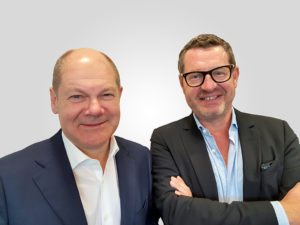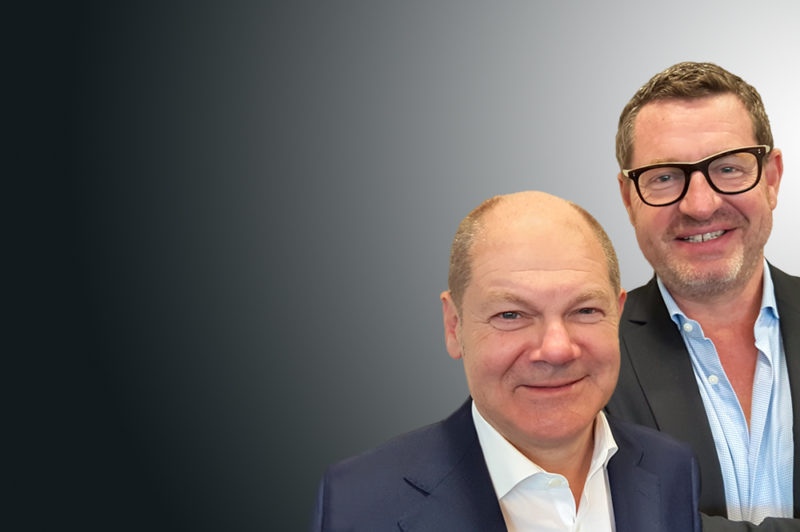
Why is populism spreading across the societies of Europe, the United States and Japan? To start off the opening debate of United Europe’s Young professional Seminar on “The Populist Challenge” from 6 to 8 October in Hamburg, Olaf Scholz pointed to countries like Denmark, Austria, the Netherlands or Germany that have few welfare, economic or wealth problems. Yet many middle-class household were seeing their income stagnating. According to a study by the consulting company McKinsey, this is fuelling populism. “There is something going on in our industrialised societies that we must take note of,” Scholz said.
Even successful companies were asking workers to accept cuts in their wages, Scholz said. He quoted former US Vice President Joe Biden who at the World Economic Forum in Davos in 2016 warned that the liberal international world order was in danger of collapsing because middle classes in Western societies were shrinking.
To safeguard European integration, Scholz added, it was absolutely necessary to ensure a good future not just for the beneficiaries of globalisation, but also for people whose skills were threatened by digitalisation. It was important to have an optimistic outlook and to give people hope. “We need a party that combines liberalism and social welfare,” the First Mayor of Hamburg said.
“Our big task is to find an answer also for those who are not skilled,” Scholz said. Otherwise, people would increasingly turn to political parties which promise easy solutions through a return to the past. “In Hamburg, we are very much in favour of self-driving cars,” he explained. “But you also have to think of what they look like to truck drivers.”
Kai Diekmann started with an allegory about the weather: real temperature often differed from the temperature felt by people. Populism, he said, didn’t have an obvious economic reasons. Instead it was more about identity and expectations. “It’s important to offer solutions to people how to survive globalisation and digitalisation and offer them positive future perspectives – not a return to the past,” Diekmann explained.
In each country, people had different reasons to vote for right-wings parties, Diekmann said. Hungary, Poland, Austria and the UK were all very different from one another with personalities and charismatic leaders at the top playing a huge role. In this sense, he was optimistic about Germany as the Alternative for Germany (AfD) simply did not have any charismatic leaders.
Another contributing factor was the feeling of a loss of control over immigration, Diekmann said. Germany had already failed to integrate Turkish immigrants over several decades, he said. So when the refugee crisis happened in 2015, there was not a great deal of trust in Chancellor Merkel’s slogan “We can do it.” Diekmann admitted that the BILD Zeitung, which under his leadership ran a “We help refugees” campaign at that time, also misread the situation and did not do justice to peoples’ feeling.
Scholz, alluding to the exceptional circumstance of the situation in 2015, conceded that it was unfortunate to lose control over who was entering Germany. Yet he insisted that integration of migrants was making progress. In Hamburg, every third child with migrant roots was finishing school with an Abitur, allowing entrance to university.
All in all, the reasons and issues of populism are diverse, depending on regions, education, identity, expectations as well as the position of the established democratic parties. In Poland, for example, Jaroslaw Kaczynski was strong because the opposition was weak, Diekmann said. The common enemy of all populists was the elites, the political establishment and technology. Populists were united in wanting to go back to a glorious, beautiful past that never existed.
The media played also a significant role in building up right-wing parties like the AfD in Germany by demonising them, Diekmann said. But it wasn’t the job of journalists to take down populists; that was the business of other politicians. The media would do best by treating parties like the AfD as normally as possible and challenging them on content. Otherwise, journalists were making it too easy for populists to lump the elites and the media together and designate them as the enemy.
After more than an hour and a very lively debate, one of the last questions was addressed to Scholz: did he see any positive side to populism at all? “No,” this leading German Social Democrat answered. “Simple answers to the complex challenges of our modern world never work, and populism has nothing to do with popular.”
The text is a summary of the opening debate “What Is Populism” with Olaf Scholz,
First Mayor of the Free and Hanseatic City of Hamburg, and Kai Diekmann, former editor and publisher of BILD at United Europe’s Young Professional Seminar from 6 to 8 October, 2017, in Hamburg.



